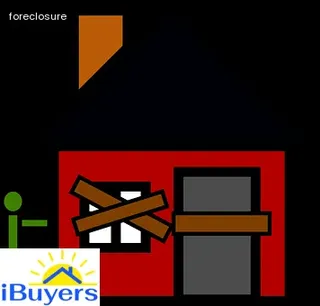Foreclosures in Kansas can be a difficult and confusing process to navigate. Knowing the timeline of how long it takes is critical for those facing foreclosure.
There are several steps to the process, which take place over a period of months, depending on the specific circumstances. In general, foreclosures in Kansas begin with a notice of default being sent to the homeowner.
This is followed by a post-default notification and notice of sale, as well as a redemption period where the homeowner has a chance to pay off their debt before the property is sold at an auction. Once the property has been sold, an assignment of deed is filed and recorded with the county clerk's office.
This marks the end of the foreclosure process in Kansas and signifies that ownership has been transferred from the homeowner to the new owner. Understanding this timeline is essential for anyone facing foreclosure in Kansas so they have time to prepare and take action if necessary.

In Kansas, borrowers can choose from a variety of mortgage loan options. Conventional mortgages are the most common and usually require a minimum credit score of 620 and 10% down payment. FHA loans require a smaller down payment of
5%, but come with higher interest rates. VA loans are available to military personnel, veterans, and their families with no requirement for a down payment or private mortgage insurance (PMI). USDA loans are also offered to low-income earners that meet certain income requirements and enable them to qualify for 100% financing. For those with less than perfect credit, there are non-conforming loans that may accept lower credit scores. Lastly, jumbo loans are available for those looking to borrow more than the conforming loan limit of $510,400 in the state of Kansas.
When a homeowner in Kansas misses a mortgage payment, the foreclosure process may begin. This could take anywhere from 90 to 120 days on average, depending on the lender and their policies.
Generally, lenders will send out a notice of intent to foreclose that informs the homeowner of their delinquency. This document usually states that the loan must be brought current within 30 days or legal action to collect the debt may be taken.
If payment is not received within this deadline, the lender can file for foreclosure and begin the process of taking possession of the home through judicial proceedings. The homeowner will then have an opportunity to cure the default by paying all past due amounts and late fees before a judge signs off on foreclosure.
Depending on local court schedules, this process can take several months before ownership is transferred from borrower to lender.

Foreclosure is a lengthy process and the timeline varies from state to state. In Kansas, it generally takes between six months and two years for a foreclosure to be completed.
The timeline begins when the homeowner defaults on their mortgage payments and the lender files a Notice of Default with the court. From here, the homeowner has three months to cure the default or enter into a repayment plan with the lender.
If neither of these options is taken, then an Order of Sale will be issued by the court and published in local newspapers for four weeks. During this time period, the property will be available for sale on the open market and if no bids are made that satisfy the amount owed on the loan, then it will go back to the lender who can repossess it.
The foreclosure process is ultimately completed when all legal proceedings have been finalized and possession of the property has been transferred from homeowner to lender.
In Kansas, the pre-foreclosure process begins when a homeowner falls behind on their mortgage payments. As soon as the loan servicer has determined that the homeowner is delinquent and unable to bring their loan current, they will send out a notice of default.
From there, the loan servicer can proceed with foreclosure proceedings if the homeowner does not respond or take action. However, there are some options available to homeowners during this period that could potentially stop or delay foreclosure proceedings.
These include contacting the lender directly to discuss repayment plans, working with a housing counselor, refinancing their loan, filing for bankruptcy protection, and selling their property in a short sale. Although none of these options guarantee an outcome, they do offer homeowners some time and flexibility to explore solutions before having to face foreclosure.

In Kansas, it is possible to reinstate the mortgage before a foreclosure sale takes place. This means that even if the homeowner has missed payments and is at risk of foreclosure, they have the opportunity to bring their account current by paying past due amounts, late fees, and any other costs associated with the home loan.
Reinstating the mortgage allows homeowners in Kansas to keep their homes while avoiding a foreclosure sale. To be successful in reinstating a mortgage before a foreclosure sale, homeowners should be aware of their rights and understand all of the deadlines that must be met.
Homeowners should also contact their lender as soon as they miss a payment or become aware of impending foreclosure proceedings so that they can take advantage of any potential opportunities for reinstatement. By working closely with their lender and understanding the timeline for foreclosure proceedings in Kansas, homeowners can get back on track and avoid losing their home through a foreclosure sale.
In Kansas, a foreclosure sale is the culmination of a lengthy process that can take anywhere from four to six months or longer depending on the circumstances. After the sale is finalized, the homeowner has one final chance to recoup some of their losses: the Redemption Period.
During this period, which typically lasts for seven months, homeowners have the opportunity to repurchase their home by paying the full amount of the debt plus associated costs. To do this they must file a redemption petition in court and post an appropriate bond with the court clerk.
If they are successful in reclaiming ownership during this period then all their legal rights will be restored and future claims against them for any remaining debt will be extinguished. However, if redemption does not occur then title will pass to the purchaser at auction and all rights of redemption by former owners will cease.

When a homeowner in Kansas fails to make their mortgage payments, they may receive a breach letter from their lender that outlines the timeline of their foreclosure. Breach letters are an important part of the foreclosure process as they provide homeowners with information about the current status of their loan and how long it will take for them to be foreclosed upon.
The contents of these letters will vary depending on the specifics of the loan, but typically they include details like how much money is owed and when payment must be made in order to avoid foreclosure. Additionally, breach letters can also inform homeowners about the consequences that come with missing payments or defaulting on their loan, such as additional fees and legal action.
Knowing what is included in a breach letter is essential for understanding how long a foreclosure might take and what steps need to be taken in order to prevent it from happening.
The foreclosure process in Kansas is a long and complex process. It typically begins when a lender sends the borrower a Notice of Default, which is an official document from the court stating that the borrower is behind on mortgage payments.
The borrower then has the opportunity to catch up on their payments, but if they do not, the lender may move to file a Notice of Foreclosure with the court. This notice must be published in a newspaper for three consecutive weeks and also served to the borrower by certified mail.
Following this, an auction is held where the home can be sold to recover any money owed by the borrower to their lender. After the auction, if there is still money owed on the loan, a deficiency judgment may be issued against the borrower in order to recover any remaining balance.
During this time, it's important for borrowers to stay informed of their rights as they navigate this difficult process.

Navigating state foreclosure laws can be a daunting task for homeowners facing financial hardship. In Kansas, the timeline for a foreclosure varies depending on the applicable law and the lender's procedures. Foreclosure laws are complex and often vary from state to state, so it is important that homeowners understand how long they have before their property is foreclosed upon.
Generally speaking, the process of foreclosure in Kansas involves several steps that take place over an extended period of time. The first step is the pre-foreclosure or notice of default period, which typically lasts 90 days after a missed payment. During this time, the homeowner has an opportunity to cure the default or reach an agreement with their lender to avoid foreclosure.
If these efforts are unsuccessful or not pursued at all, then the lender may proceed with filing a Notice of Sale with the court. This document must also be published in a local newspaper and sent via certified mail to any interested parties. After this occurs, there is typically another 90 day waiting period before a foreclosure sale can take place.
During this time, homeowners may still attempt to resolve their delinquency without losing their home through reinstatement or loan modification options offered by the lender. It is important for homeowners to understand all their options when navigating state foreclosure laws in Kansas and take action as soon as possible if they are at risk of foreclosure.
The first step in stopping a foreclosure in Kansas is to understand the timeline of the process. Depending on the circumstance, the timeline for a foreclosure can vary from a few months to several years.
Knowing this timeline is essential to developing an effective strategy to stop or delay the foreclosure. Once the timeline has been established, it is important to work with lenders and creditors to avoid or delay any legal action taken against you.
Negotiating with lenders and creditors may involve creating a repayment plan that works best for both parties or restructuring a loan so that payments become more manageable. Additionally, it is important to investigate any options available under state laws that may provide relief from foreclosure, such as mortgage assistance programs or forbearance agreements.
Finally, if all else fails, one should explore bankruptcy as an option; while this will have long-term implications and damage credit scores significantly, bankruptcy can provide instant relief and help avoid foreclosure proceedings altogether.

Foreclosures in Kansas can take anywhere from a few weeks to over a year, depending on the specific situation. The timeline for foreclosure proceedings starts when the lender files a notice of default with the county clerk's office.
From there, a 90-day redemption period begins, during which time the homeowner has an opportunity to make up any missed payments and fees or refinance their mortgage. If the homeowner does not take action within this 90-day window, an auction is scheduled in which bidders can purchase the property at a discounted price.
After the auction is complete and all money has been collected, it typically takes around 30 days for title transfer to be finalized and for ownership of the property to change hands. In some cases, this process may be extended if there are legal complications or if additional paperwork is required.
Regardless, if you are facing foreclosure in Kansas it is important to understand exactly how long your particular case will take so that you can plan accordingly and make informed decisions about your financial future.
If you're facing foreclosure in Kansas, it's important to know what resources are available to help you. Fortunately, there are experienced professionals in the state who can provide assistance.
Working with an attorney or housing counselor can give you the best chance of understanding your rights and options within the foreclosure process. They can also help you create a plan for dealing with your financial situation and potentially save your home from foreclosure.
Additionally, local housing agencies in Kansas may be able to provide free advice on preventing foreclosure and advice on how to move forward if it becomes unavoidable. While there is no one-size-fits-all answer as to how long a foreclosure takes in Kansas, depending on circumstances it could take anywhere from two months to six months or more.
Knowing where to go for help is essential when facing foreclosure, so be sure to contact experienced professionals in Kansas who can walk you through the process and make sure that all of your legal rights are protected along the way.

In Kansas, homeowners have certain rights under federal and state laws when it comes to foreclosure. The first step in the process is that lenders must provide written notice of the mortgage delinquency and their intent to foreclose by certified mail or overnight delivery.
Borrowers then have 30 days from receiving this notification to cure the default or face possible foreclosure proceedings. This timeline can vary depending on whether a borrower chooses to go through mediation or litigation.
If mediation fails, a lender may file for foreclosure in court and serve the borrower with a summons and complaint. The homeowner has 20 days from being served to respond in writing if they wish to contest the lawsuit.
After this response is received, the court will determine whether to hear the case or not before issuing an order of sale, which is typically granted within 45 days of initial filing. Once a notice of sale is issued, there must be at least 60 days between this date and the actual sale itself - unless state law permits otherwise.
After the sale takes place, funds are disbursed among creditors according to priority rights established by state and federal laws.
When dealing with an unpaid mortgage, it is important to understand the timeline of a foreclosure in Kansas. The options available depend on how far along the foreclosure process has gone.
If the mortgage is delinquent but no court action has been taken, then homeowners may be able to seek out a loan modification or other forms of repayment assistance from their lender. However, if the foreclosure process has progressed beyond that point and a sale date has been set, then other options such as refinancing or deed-in-lieu of foreclosure may still be viable depending on the situation.
It is also important to note that once an order of sale has been issued, it can take up to three months for the actual sale to take place. Homeowners should always consider their options carefully and seek professional advice if necessary before making any decisions about their unpaid mortgage.

Homeowners facing foreclosure in Kansas need to be aware of the timeline and common mistakes they should avoid during the process. Generally, foreclosure can take anywhere from three months to a year depending on the situation.
Some common mistakes to avoid are failing to stay in communication with the lender, not reading over paperwork carefully, and attempting to make changes to mortgage documents without consulting an attorney or other professional. It is also important to remember that simply ignoring the problem can result in more fees or a lack of options down the road.
It is essential for homeowners facing foreclosure in Kansas to understand their rights and responsibilities so that they can make informed decisions throughout the process.
When it comes to determining fair market value for your property during a foreclosure in Kansas, banks and lenders have an important role to play. They are responsible for setting the terms of the sale or transfer of your home and must abide by the laws in place to protect you from fraudulent practices.
It is critical that you understand your rights as a homeowner and take steps to protect yourself from any illegal eviction attempts during this process. To ensure that you are getting a fair deal on the sale of your home, research comparable properties in the area and be sure to verify all documents before signing anything.
Finally, stay informed about how long the foreclosure process typically takes in Kansas so that you can make an informed decision about how best to proceed with selling your property.
Once a foreclosure has been finalized in Kansas, homeowners have to move out of the property quickly. Typically, a homeowner is given 14 days after the sale of the property at auction to vacate.
If the homeowner fails to leave in that timeframe, they can be evicted by the sheriff's office or other law enforcement agency. Depending on circumstances and local regulations, homeowners may be able to negotiate a longer timeline with their lender or new owner of the property.
Foreclosure proceedings vary from state-to-state and it is important for homeowners to know their rights before initiating foreclosure proceedings in Kansas. Knowing the timeline involved in foreclosure proceedings and how long you have to move out after foreclosure in Kansas can help protect your rights as a homeowner and make sure you are treated fairly throughout the process.

Foreclosure is a legal process in Kansas by which a lender can regain ownership of a property after the borrower has defaulted on their mortgage payments. The foreclosure process starts when the lender files a Notice of Default with the court.
Once the Notice of Default is filed, the borrower has 90 days to cure the default or to negotiate an alternative payment arrangement with their lender. If the borrower fails to make payments or enter into an arrangement with their lender, a foreclosure sale will be scheduled.
In Kansas, this sale must take place no less than 95 days and no more than 120 days after filing of the Notice of Default. After the foreclosure sale is completed and all proceeds are allocated, title to the property will transfer from the borrower to the new owner (usually the lender).
It’s important for borrowers in Kansas to understand that once a Notice of Default has been filed, there may only be a few months until their home is auctioned off at foreclosure. Knowing how long it takes for each step of this process can help them plan accordingly and potentially avoid foreclosure altogether.
If you are facing a foreclosure in Kansas, the most important thing to do is take action immediately. There are several steps you can take to try and stop a foreclosure and protect your home.
The first thing you should do is contact your mortgage company or servicer and explain your situation. Ask them if they can work with you to modify your loan terms or offer another solution that could help you keep your home.
You may also want to consider refinancing your loan with a new lender who can provide more favorable terms. Additionally, contacting a HUD-approved housing counselor can provide you with helpful advice on foreclosure prevention options in Kansas.
It’s important to act quickly so that you have more time and flexibility in finding solutions for avoiding a foreclosure in Kansas.
If you're a homeowner in Kansas, it's important to understand the timeline of foreclosure. Knowing how many months behind on your mortgage payments before you go into foreclosure can help you take steps to avoid it.
Generally, if you've missed two consecutive monthly payments, you will be past due and could face foreclosure proceedings. The length of time from missing two payments until foreclosure can vary depending on the specific lender and loan type.
In some cases, lenders may not begin legal action for up to six months after missed payments, giving homeowners the opportunity to catch up on their payments or seek other options such as loss mitigation or refinancing. It's important to contact your lender as soon as possible if you think you will miss a payment so that they can work with you and help find a solution that works best for everyone involved.
Kansas has the longest foreclosure process of any state in the country. The typical foreclosure timeline in Kansas can take up to 14 months or longer depending on the individual case.
This makes it one of the longest foreclosure processes in the nation. The lengthy process is primarily due to the fact that Kansas requires judicial foreclosures, meaning lenders must go through an extensive legal process before they are allowed to repossess a property.
This includes filing a lawsuit, serving notice, and waiting for a court order before a lender can seize and sell a property. Furthermore, every step of this process requires additional time as lenders must wait for court hearings and rulings from judges, as well as give homeowners ample time to find alternate solutions such as loan modifications or repayment plans.
As such, those facing foreclosure in Kansas should be prepared for a long journey ahead if they don't seek help from attorneys or housing counselors specializing in foreclosure proceedings.
After a sheriff sale in Kansas, the house is conveyed to the highest bidder. The successful bidder gets a deed to the home and must then wait up to 30 days for the court to confirm the sale.
The lender then has 15 days after confirmation to file an action in district court if they wish to recover any deficiency judgments or pursue deficiency actions against any of the parties involved. After that period has elapsed, the borrower no longer has ownership of the property, and title will be transferred to the new owner.
At this point, tenants occupying the residence may be evicted by either filing an eviction lawsuit or serving a 3-day notice for nonpayment of rent. It is important for borrowers to understand their rights during this process and seek legal advice if necessary.
A: The timeline for foreclosure in Kansas can vary depending on several factors, including the lender's process, whether or not the borrower is contesting the foreclosure and/or working out a settlement agreement, and any other applicable state laws. Generally speaking, it can take anywhere from four to nine months for a foreclosure to be completed in Kansas.
A: The foreclosure process typically takes between six and nine months when a law firm is involved in Kansas.

A: The foreclosure process in Kansas typically takes between three to five months when mortgage servicers and mortgage servicing are involved. However, the timeline can be longer if legal action is necessary.
A: The typical foreclosure process in Kansas, when handled with the involvement of a lawyer and mortgage debt, can take anywhere from 4-12 months. However, there are options to avoid foreclosure in Kansas such as loan modifications, forbearance agreements and repayment plans that may reduce or eliminate the need for foreclosure.
A: In Kansas, the process of obtaining a summary judgment in a foreclosure case involving a promissory note and contracts can take anywhere from several months to one year or more, depending on the complexity of the case and whether it is contested by the debtor.

A: Foreclosures in Kansas with the involvement of the CFPB and Consumer Financial Protection Bureau can take anywhere from 45 to 90 days, depending on the circumstances surrounding the case.
A: The foreclosure process can take anywhere from three to six months to complete in Kansas, depending on the involvement of a lawyer, mortgage loan and mortgage debt. The length of time may be extended due to the impact of COVID-19 on foreclosures in Kansas.
A: The length of time it takes to complete a foreclosure in Kansas ultimately depends on the complexity of each individual case. However, with the help of a lawyer and mortgage loan debt, a foreclosure can usually be completed within 6-12 months.

A: The time frame for foreclosure in Kansas generally takes between 3-6 months with the involvement of a lawyer, mortgage loan, and mortgage debt.
A: Emails should be sent on a regular basis during the foreclosure process in Kansas, as frequently as is necessary to keep all parties informed of any changes or developments. However, since the length of time required for a foreclosure in Kansas will vary depending on market conditions and other factors, it is best to consult with a lawyer experienced in mortgage debt and loan foreclosure law to determine the optimal frequency for sending emails.
A: Having an attorney involved in the foreclosure process can help to ensure that all legal steps are taken in a timely manner, and can often help expedite the length of time it takes for a foreclosure to be finalized. In Kansas, attorneys must adhere to rules of professional conduct, such as maintaining client confidentiality and refraining from using auto-dialers or other forms of mass communication that might compromise the attorney-client relationship.
A: IN KANSAS THE legal motion of foreclosure typically takes between 90 to 120 days from start to finish with a lawyer involved. This timeline may vary depending on the terms of the mortgage loan and debt.